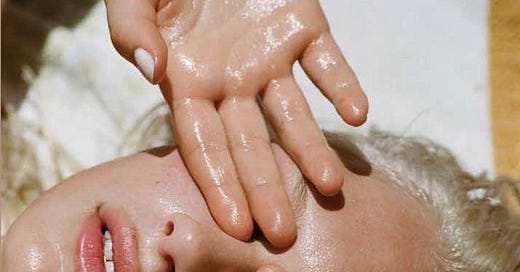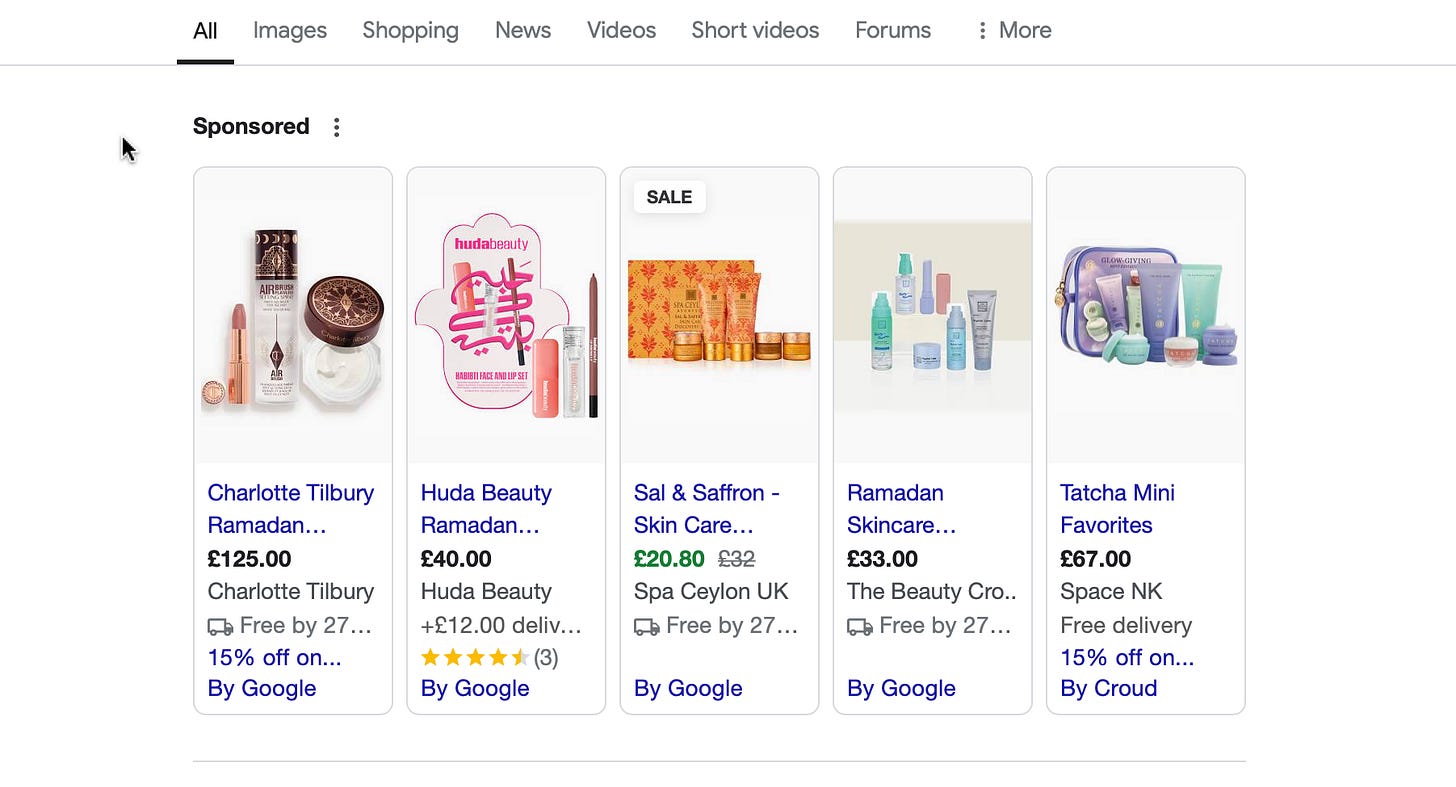Beauty, Overconsumption, and the Spirit of Ramadan
Do we really need a new Ramadan skincare routine?
As a beauty editor, I’ve spent years telling people what to buy. I’ve written the Ramadan skincare essentials lists, the fasting-friendly beauty swaps, the hydrating must-haves for dry, depleted skin. Every year, without fail, the industry finds a way to frame Ramadan as yet another occasion for consumption. Your skin is suffering, they say. You need this serum, this mist, this limited-edition ‘Ramadan glow’ set (whatever that means).
It’s a script, I know too well. And I get it, Ramadan can be tough on the skin. The long hours without water, the late-night meals, the sleep deprivation, the erratic schedule. It’s not exactly an ideal environment for a “glow-up.” But does that mean we need to overhaul our entire routine? Or is this just another case of beauty marketing exploiting our insecurities?
This year, I’m looking at it differently. More like taking accountability. Ramadan isn’t about more, it’s about less. Less distraction, less indulgence, less of everything that pulls us away from what actually matters. It’s a month that asks us to strip back, to be grateful, to realise that we already have enough. So why do we let beauty marketing convince us otherwise?
At this point, the industry treats Ramadan like any other seasonal cash grab, another chance to sell us things we don’t really need. It moves fast, cultural events are money making machines for the indusrty.
Christmas gets beauty advent calendars. Valentine’s Day gets limited-edition red lipsticks. Ramadan? We get “fasting-proof” skincare and overpriced gift sets wrapped in gold and green packaging, which can I just say is not at all aesthetically pleasing and this is coming from a Muslim.
Ramadan is a time of restraint. Yet somehow, the messaging around beauty in Ramadan plays into the same anxieties the industry thrives on year-round: Your skin is suffering. Your hydration levels are low. You’re not doing enough. Fix it. Do we, though?
Jessica DeFino, beauty critic, has long argued that the idea of skin constantly needing intervention is a myth designed to keep us consuming. “The beauty industry thrives on convincing people they’re incomplete,” she writes. “But skin is self-sufficient - it knows what to do.”
And that’s what we forget. Skin is an organ. It adapts, regulates itself, protects and repairs. Fasting doesn’t break it. If anything, research suggests fasting actually promotes cellular repair throughout the body-including the skin. So why are we being told Ramadan is a skincare emergency?
Science backs what we already know deep down: our skin does not need as much as we think it does. Autophagy, a process triggered by fasting, clears out damaged cells and regenerates new ones. Dermatologists like Dr. Thivi Maruthappu have pointed out that fasting doesn’t inherently disrupt skin function. “The body is incredibly resourceful,” she explains. “It knows how to protect and repair itself. Often, the best thing we can do for our skin is to step back and allow it to function without interference.”
But stepping back isn’t easy. Not when skincare has become an identity, a hobby, a form of self-care we’re constantly told we need to invest in. The more we do, the more we care or at least, that’s what we’ve been led to believe. Stripping back feels counterintuitive. What if my skin does get dry? What if I break out? What if I regret not buying that hydration set on sale?
And that’s the worry, isn’t it? That if we don’t keep up, if we don’t buy the right products or stick to the perfect routine, our skin will suffer and it will be our fault. We’ve been conditioned to believe that neglecting to micromanage our skin is some kind of personal failure, that dryness or dullness is a punishment for not doing enough. Is that really true, or just another way the beauty industry keeps us hooked?
But isn’t Ramadan about quieting that noise? About trusting that less can actually be more?
It’s ironic, really. A month that is meant to teach us moderation and self-discipline has, in many ways, become a season of excess - especially when it comes to consumption and waste. Studies have shown that food waste spikes dramatically during Ramadan, with some countries reporting a 50% increase in discarded food. The same applies to consumer goods, from clothing to beauty products. Limited-edition “Ramadan collections” encourage overbuying, while excessive packaging and single-use beauty items contribute to environmental strain. It’s a contradiction that’s hard to ignore: a month meant to instill gratitude and restraint is now a peak time for overconsumption.
So if Ramadan teaches us to take only what we need, shouldn’t that extend to our beauty routines, too?
I won’t pretend I have this all figured out. I’m a beauty editor, after all. I love skincare. I love the ritual of it, the sensory experience, the joy of finding something that works. But I also know that half the battle is recognising when the industry is preying on our insecurities, especially during a time that’s supposed to be about detachment from excess.
So this Ramadan, I’m not buying anything new. Not because I don’t love beauty, but because I want to challenge the idea that my skin needs constant intervention. Because I know that whatever I already have is enough. And maybe, just maybe, if I can resist the urge to panic-buy a “Ramadan glow” serum, I can take that same discipline into other areas of my life too. Maybe instead of obsessing over my moisture barrier, I focus on strengthening my patience. Maybe instead of layering on another product, I layer on more compassion,for myself, for others, for the world.
Ramadan asks us to pause. To reassess. To consume less and not just in terms of food, but in all aspects of life. It asks us to trust. To recognise that we already have what we need. Maybe this year, we extend that lesson to beauty too. Because the truth is, our skin will survive Ramadan. It always has, because it knows what to do.
Face Value is a “weekly” newsletter about beauty, culture, and the way we perceive beauty. If this is something you’re interested in, consider subscribing and sharing.





